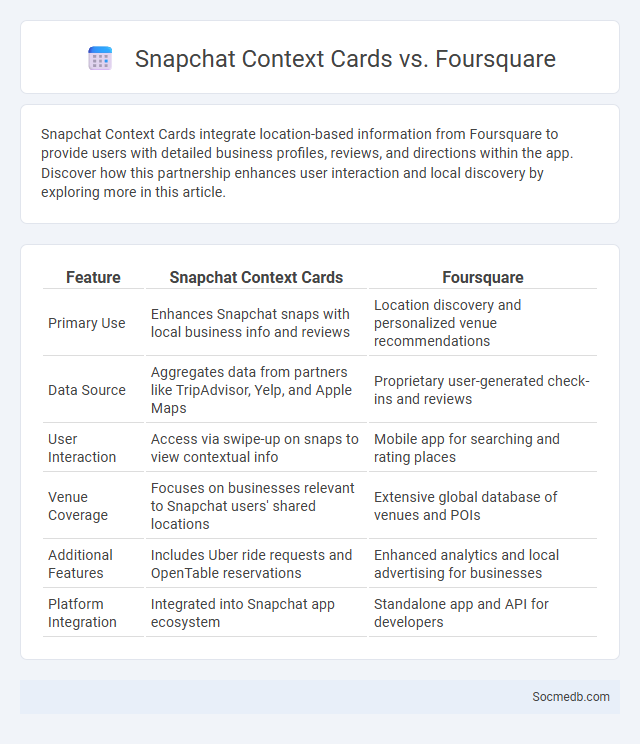
Photo illustration: Snapchat Context Cards vs Foursquare
Snapchat Context Cards integrate location-based information from Foursquare to provide users with detailed business profiles, reviews, and directions within the app. Discover how this partnership enhances user interaction and local discovery by exploring more in this article.
Table of Comparison
| Feature | Snapchat Context Cards | Foursquare |
|---|---|---|
| Primary Use | Enhances Snapchat snaps with local business info and reviews | Location discovery and personalized venue recommendations |
| Data Source | Aggregates data from partners like TripAdvisor, Yelp, and Apple Maps | Proprietary user-generated check-ins and reviews |
| User Interaction | Access via swipe-up on snaps to view contextual info | Mobile app for searching and rating places |
| Venue Coverage | Focuses on businesses relevant to Snapchat users' shared locations | Extensive global database of venues and POIs |
| Additional Features | Includes Uber ride requests and OpenTable reservations | Enhanced analytics and local advertising for businesses |
| Platform Integration | Integrated into Snapchat app ecosystem | Standalone app and API for developers |
Introduction to Contextual Discovery Platforms
Contextual Discovery Platforms utilize advanced algorithms to analyze user behavior and preferences, enabling personalized content delivery across social media channels. These platforms enhance your social media experience by presenting relevant ads, articles, and connections based on real-time context rather than just keywords or search history. Leveraging machine learning and natural language processing, they ensure that your interactions are more meaningful and tailored to current interests.
What Are Snapchat Context Cards?
Snapchat Context Cards provide users with detailed information about locations, events, and businesses linked to Snaps, enhancing the social media experience by offering seamless access to reviews, contact details, and directions. These interactive cards integrate data from sources such as TripAdvisor, Foursquare, and OpenTable, enabling users to explore and engage without leaving the app. By leveraging location-based metadata, Snapchat Context Cards streamline discovery and decision-making directly within the Snapchat interface.
Foursquare: Pioneer in Location-Based Services
Foursquare revolutionized social media by pioneering location-based services, enabling users to check in at various venues and share experiences in real-time, which enhanced local discovery and personalized recommendations. Its powerful geolocation technology and user-generated data helped businesses target audiences with precision and improved consumer engagement. Foursquare's platform laid the groundwork for subsequent location-aware social networks, influencing mobile app development and digital marketing strategies.
Core Features Comparison
Social media platforms differ primarily in core features such as user engagement tools, content formats, and privacy settings. Facebook emphasizes comprehensive user profiles, news feeds, and robust advertising options, while Instagram focuses on visual content sharing with stories and reels. Twitter offers real-time microblogging with hashtags and trending topics, whereas LinkedIn concentrates on professional networking, job postings, and industry news.
User Experience: Snapchat vs. Foursquare
Snapchat offers an immersive user experience with its ephemeral multimedia messaging, augmented reality filters, and seamless story sharing, fostering real-time interaction and visual engagement. Foursquare emphasizes location-based discovery, providing personalized recommendations and check-in features that enhance social exploration and local business engagement. Both platforms prioritize intuitive interfaces but cater to distinct user needs: Snapchat focuses on dynamic social communication, while Foursquare centers on spatial navigation and community-driven insights.
Data Sources and Integration
Social media platforms generate vast amounts of data from user interactions, posts, comments, and multimedia content, serving as rich data sources for analysis. Effective integration of this data involves combining structured and unstructured datasets using APIs, data lakes, and ETL processes to ensure comprehensive and real-time insights. Leveraging advanced tools like social listening and sentiment analysis platforms enhances the ability to extract meaningful patterns and trends from integrated social media data streams.
Privacy and Data Sharing Concerns
Social media platforms often collect extensive data from users, including personal information and browsing habits, which raises significant privacy concerns. Your data may be shared with third-party advertisers or partners, increasing the risk of unwanted exposure and potential misuse. Understanding privacy settings and data-sharing policies is crucial to protect your online presence and maintain control over personal information.
Business and Marketing Potential
Social media platforms like Facebook, Instagram, and LinkedIn offer unparalleled opportunities for business growth and targeted marketing strategies. Leveraging data analytics and user demographics enables companies to optimize ad campaigns, increase brand visibility, and drive customer engagement. The integration of influencer partnerships and content marketing on social media significantly enhances lead generation and conversion rates.
Limitations and Challenges
Social media platforms face significant limitations such as data privacy concerns, misinformation spread, and algorithmic biases that can distort user experience and content visibility. Your engagement may be impacted by the saturation of content, making it difficult to reach the intended audience organically. Addressing these challenges requires continuous monitoring of platform policies and proactive management of your digital presence.
Future of Contextual Discovery Tools
Future of contextual discovery tools in social media will leverage AI and machine learning to deliver hyper-personalized content, enhancing user engagement by understanding your preferences and behavior in real-time. These tools will analyze vast data sets, including location, activity, and social signals, to provide relevant recommendations and ads that resonate with individual users. Brands and users alike will benefit from increased efficiency and relevance in content discovery, driving deeper connections and more meaningful interactions on social platforms.
 socmedb.com
socmedb.com